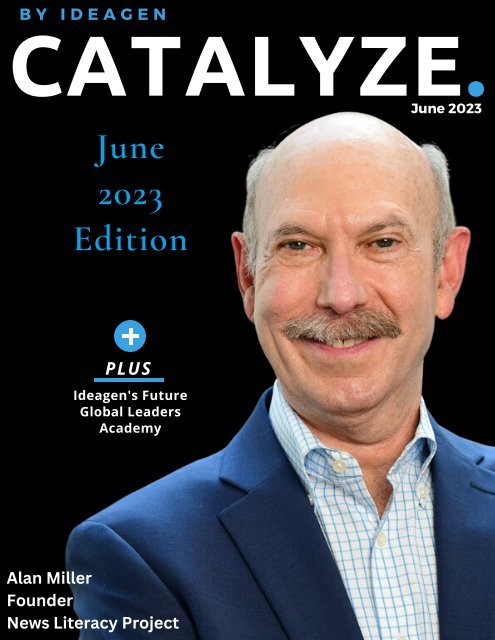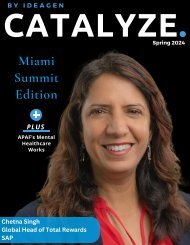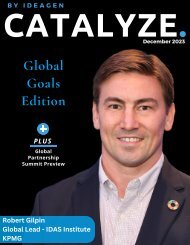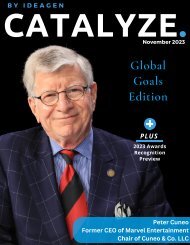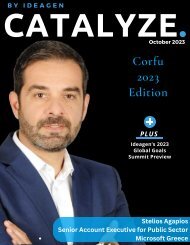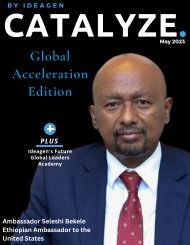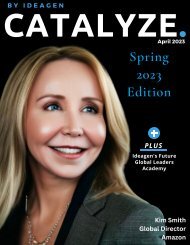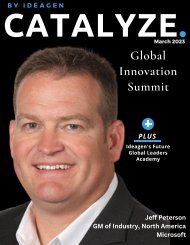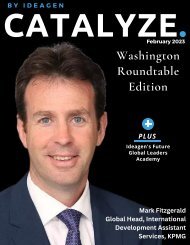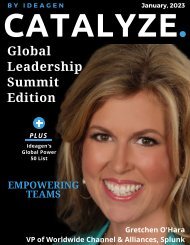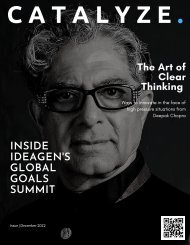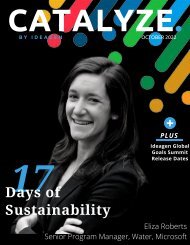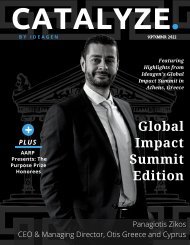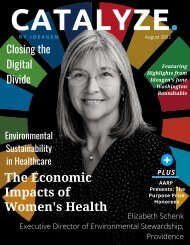Ideagen Global - Catalyze Magazine - June 2023
With Ideagen's extensive member network and influential platform, Catalyze Magazine serves as an aggregate for all the content, events, articles, and collaboration that we do. It is a monthly magazine where you will find transcriptions from Ideagen events, content, articles, and information surrounding how we are completing our mission. With this magazine, we want to highlight the nature of cross-sector collaboration and how we infuse it into our daily mission on a global scale. Ideagen's monthly Catalyze Magazine is back in 2023 with our May edition. Inside, view conversations from the 2023 Global Acceleration Summit, hosted at the Embassy of Ethiopia! This months covers features speakers: Alan Miller, Sharon Price John, Susan Cotton, Winston Chang, Georgette Boulegeris, Jane Oates, Theodoros Bizakis, & Samson Arega!
With Ideagen's extensive member network and influential platform, Catalyze Magazine serves as an aggregate for all the content, events, articles, and collaboration that we do. It is a monthly magazine where you will find transcriptions from Ideagen events, content, articles, and information surrounding how we are completing our mission. With this magazine, we want to highlight the nature of cross-sector collaboration and how we infuse it into our daily mission on a global scale.
Ideagen's monthly Catalyze Magazine is back in 2023 with our May edition. Inside, view conversations from the 2023 Global Acceleration Summit, hosted at the Embassy of Ethiopia!
This months covers features speakers: Alan Miller, Sharon Price John, Susan Cotton, Winston Chang, Georgette Boulegeris, Jane Oates, Theodoros Bizakis, & Samson Arega!
Create successful ePaper yourself
Turn your PDF publications into a flip-book with our unique Google optimized e-Paper software.
B Y I D E A G E N<br />
CATALYZE.<br />
<strong>June</strong> <strong>2023</strong><br />
<strong>June</strong><br />
<strong>2023</strong><br />
Edition<br />
PLUS<br />
<strong>Ideagen</strong>'s Future<br />
<strong>Global</strong> Leaders<br />
Academy<br />
Alan Miller<br />
Founder<br />
News Literacy Project
B Y I D E A G E N<br />
CATALYZE.<br />
<strong>June</strong><br />
<strong>2023</strong><br />
Edition<br />
<strong>June</strong> <strong>2023</strong><br />
PLUS<br />
<strong>Ideagen</strong>'s Future<br />
<strong>Global</strong> Leaders<br />
Academy<br />
Sharon Price John<br />
CEO<br />
Build-A-Bear Workshop
Susan Cotton<br />
Founder<br />
The Lily Project<br />
B Y I D E A G E N<br />
CATALYZE.<br />
<strong>June</strong> <strong>2023</strong><br />
<strong>June</strong><br />
<strong>2023</strong><br />
Edition<br />
PLUS<br />
<strong>Ideagen</strong>'s Future<br />
<strong>Global</strong> Leaders<br />
Academy
Winston Chang<br />
CTO, <strong>Global</strong> Public Sector<br />
Snowflake<br />
B Y I D E A G E N<br />
CATALYZE.<br />
<strong>June</strong> <strong>2023</strong><br />
<strong>June</strong><br />
<strong>2023</strong><br />
Edition<br />
PLUS<br />
<strong>Ideagen</strong>'s Future<br />
<strong>Global</strong> Leaders<br />
Academy
B Y I D E A G E N<br />
CATALYZE.<br />
<strong>June</strong> <strong>2023</strong><br />
<strong>June</strong><br />
<strong>2023</strong><br />
Edition<br />
PLUS<br />
<strong>Ideagen</strong>'s Future<br />
<strong>Global</strong> Leaders<br />
Academy<br />
Georgette Boulegeris<br />
Grand President<br />
Daughters of Penelope
Jane Oates<br />
President<br />
WorkingNation<br />
B Y I D E A G E N<br />
CATALYZE.<br />
<strong>June</strong> <strong>2023</strong><br />
<strong>June</strong><br />
<strong>2023</strong><br />
Edition<br />
PLUS<br />
<strong>Ideagen</strong>'s Future<br />
<strong>Global</strong> Leaders<br />
Academy
B Y I D E A G E N<br />
CATALYZE.<br />
<strong>June</strong><br />
<strong>2023</strong><br />
Edition<br />
<strong>June</strong> <strong>2023</strong><br />
PLUS<br />
<strong>Ideagen</strong>'s Future<br />
<strong>Global</strong> Leaders<br />
Academy<br />
Theodoros Bizakis<br />
Deputy Chief of Mission<br />
Greek Embassy to the<br />
United States
B Y I D E A G E N<br />
CATALYZE.<br />
<strong>June</strong> <strong>2023</strong><br />
<strong>June</strong><br />
<strong>2023</strong><br />
Edition<br />
PLUS<br />
<strong>Ideagen</strong>'s Future<br />
<strong>Global</strong> Leaders<br />
Academy<br />
Samson Arega<br />
Regional Director, Sales, Marketing &<br />
Services<br />
Ethiopian Airlines
TABLE OF<br />
CONTENTS<br />
01 Alan Miller<br />
Founder, The News Literacy Project<br />
02 Sharon Price John<br />
CEO, Build-A-Bear Workshop<br />
03<br />
04<br />
05<br />
06<br />
07<br />
08<br />
Susan Cotton<br />
Founder, The Lily Project<br />
Winston Chang<br />
CTO of <strong>Global</strong> <strong>Global</strong> Public Sector, Snowflake<br />
Georgette Boulegeris<br />
Grand President, Daughters of Penelope<br />
Jane Oates<br />
President, WorkingNation<br />
Theodoros Bizakis<br />
Deputy Chief of Mission, Greek Embassy to the United States<br />
Samson Arega<br />
Regional Director, Sales, Marketing & Services, Ethiopian Airlines
T H E I M P A C T A N D I M P L E M E N T A T I O N<br />
O F T H E N E W S L I T E R A C Y P R O J E C T<br />
WITH ALAN MILLER, FOUNDER OF<br />
THE NEWS LITERACY PROJECT<br />
George Sifakis: Where have you seen your<br />
work have the greatest impact?<br />
News Lit. Project<br />
Alan Miller: Our greatest impact has been<br />
with the next generation, middle school, and<br />
high school students specifically. They are<br />
living in the most complex information<br />
ecosystem in history, one that they did not<br />
create and are not well equipped to navigate.<br />
They've got more good and credible<br />
information available to them literally at their<br />
fingertips than at any other time. But it's<br />
competing for their attention with<br />
exponentially more information that's not<br />
intended to inform in an accurate, fact-based,<br />
dispassionate, and contextual way but to<br />
persuade, sell, misinform, exploit, and<br />
inflame. So how do they navigate that<br />
landscape where they can sort the news from<br />
the noise, the credible, from the uncredible,<br />
and the actionable from the exorable?<br />
Alan: For the first dozen years, this was our<br />
sole focus. Now it remains a prime focus by<br />
reaching students through educators in every<br />
state in the country to empower them to do this<br />
in a way that is responsible, credible, and that<br />
really lifts their voices. I've seen through my<br />
experience in classrooms, anecdotes, and our<br />
data that this critical thinking skill is essential in<br />
the information age, and it is incredibly<br />
empowering and transformative for young<br />
people in particular.<br />
George: And the News Literacy Project works<br />
with so many communities across America to<br />
implement your solutions, specifically in course<br />
criteria. How does that all work?<br />
CATALYZE MAGAZINE | 1
A L A N M I L L E R & T H E N E W S L I T E R A C Y<br />
P R O J E C T C O N T I N U E D . . .<br />
Alan: This is such a broadly applicable skill that we've found we're able to work with history,<br />
social studies, government, English, humanities, and journalism teachers. It's also been used<br />
by many librarians. We have a virtual classroom we call "Checkology," which is highly<br />
adaptable and extremely engaging, and it can be integrated when educators teach about the<br />
First Amendment, press & politics, or when they're giving students skills to use primary<br />
sources and research. We've found that we can work both top-down and bottom-up.<br />
Educators have found us all across the country and all across the world, to use Checkology.<br />
We're working directly with more than three dozen school districts, including the largest<br />
districts in urban areas in New York, Los Angeles, and Chicago, but also in South Carolina,<br />
Texas, Alabama, and Indiana. We are rigorously non-partisan, and we've been able to work<br />
with teachers and districts in red states, purple states and blue states, urban areas, and rural<br />
areas to reach students throughout the country.<br />
Alan Miller & Ethiopian Ambassador Seleshi Bekele<br />
<strong>Ideagen</strong> CEO George Sifakis interviews Alan Miller<br />
CATALYZE MAGAZINE | 2
T H E N E W S L I T E R A C Y P R O J E C T<br />
F I N A L<br />
George: I love that. Rigorously non-partisan. And so, you're well on your way to establishing<br />
the News Literacy Project across America. What's next for the international stage?<br />
Alan: When we created Checkology in 2016, it was really a domestic-based platform. It's in<br />
English, we had a lesson on the First Amendment, and most of the media examples we use are<br />
from the US. But what we found is that misinformation, disinformation, and conspiratorial<br />
thinking know no boundaries. This is an existential global challenge. We've seen educators<br />
using the platform in well over 100 countries, and we responded to that by creating a lesson on<br />
world press freedoms. We also created a lesson in English and Spanish, and we've done work<br />
throughout the world at conferences through professional development and webinars. We have a<br />
colleague based in Barcelona who handles our international work, and we are poised, if there<br />
was interest and support, to create a version of Checkology for other countries in other<br />
languages using journalists and media in those countries because we've seen that in places like<br />
Myanmar and India that disinformation can be used to incite ethnic violence and lead to<br />
tragedies and death. This is why it is a global need.<br />
CATALYZE MAGAZINE | 3
REFLECTIONS<br />
FROM WRITING<br />
"STORIES & HEART"<br />
BY SHARON PRICE JOHN<br />
CEO<br />
BUILD-A-BEAR WORKSHOP<br />
Build-A-Bear<br />
George Sifakis: Last time we spoke, you<br />
were about to release your book, 'Stories &<br />
Heart.' Now that it's officially published,<br />
could you kindly share and reflect on the<br />
experience of writing this book?<br />
Sharon Price John: George, this was a<br />
crazy experience at a crazy time. When<br />
Forbes reached out, I was struggling with<br />
what I wanted to write about. I didn't want<br />
to write a traditional business book, and<br />
we found a real balance of exploring<br />
different stories that have happened to me<br />
throughout my life and how they've<br />
impacted me. We put it together in a bit of<br />
a construct that pushes the reader to reflect<br />
on their own lives and the moments that<br />
impacted them. What did you do with<br />
those moments, and how did they either<br />
move them forward or hold them back?<br />
Sharon: It's a postulation that it's not<br />
what happens in your life; it's the<br />
information and narratives you read<br />
that weave around all of these things<br />
that are either empowering or<br />
disempowering for people. I wanted to<br />
dismantle that and give people ways to<br />
reflect and think about setting goals,<br />
getting rid of some of this negative<br />
self-talk, or rethinking their objectives<br />
based on how they evolve in their lives<br />
and opening up their apertures for<br />
getting off the beaten path and trying<br />
the scenic route for a minute because<br />
you never know what could come<br />
from that.<br />
CATALYZE MAGAZINE | 4
REFLECTIONS FROM "STORIES &<br />
HEART CONTINUED<br />
Sharon: We put this book together with a workbook inserted inside with lots of fun<br />
reflections on everything back to my childhood, but it's also a loose narrative of my<br />
business career through the trials and tribulations of being on Barbie at Mattel, being the<br />
head of the US toy division at Hasbro, and even some of the difficulties of the turnaround<br />
with Build-A-Bear and the retail apocalypse during Covid. I wrote this book during<br />
Covid because we signed the deal with Forbes right before it hit, and I stretched out the<br />
writing so I could reflect on that experience to find meaning in what we went through to<br />
get Build-A-Bear to an entirely new place during some of those difficult moments for<br />
everyone, particularly retail environments where 90% of our revenue stream was shut<br />
down because we closed down all of our stores across the globe in a 48 hour period in<br />
March of 2020. That takes a different kind of leadership team to maneuver, things like<br />
that.<br />
Looking back on it now, I think it was a remarkable experience and almost cathartic to<br />
capture that while it was going on, but the outcome has been humbling and amazing.<br />
We're on the bestsellers list in many categories, including business and mentoring, and<br />
I've been touched by some of the feedback and am so excited to have completed it and<br />
fought through it because it was not simple.<br />
"Stories & Heart" by<br />
Sharon Price John<br />
available now!<br />
Click the link below to learn more<br />
CATALYZE MAGAZINE | 5
I D E A G E N G L O B A L<br />
P R E S E N T S<br />
<strong>2023</strong><br />
GLOBAL<br />
ACCELERATION<br />
SUMMIT<br />
A S S E S S I N G T H E P R O G R E S S O F T H E U N<br />
S D G ' S A T T H E M I D W A Y P O I N T T O 2 0 2 3<br />
H O S T E D A T T H E E M B A S S Y O F E T H I O P I A<br />
N O W S T R E A M I N G O N I D E A G E N<br />
<strong>Ideagen</strong>global.com | Presented <strong>Global</strong>ly by<br />
CATALYZE MAGAZINE | 6
P I L L A R S O F T H E L I L Y<br />
P R O J E C T<br />
W I T H F O U N D E R , S U S A N C O T T O N<br />
The Lily Project<br />
Barb Quantaince: I know you care very<br />
much, not just about the work and the cause,<br />
but also how you do it. Can you name what<br />
you might consider the key principles in how<br />
the Lily project works?<br />
Susan Cotton: Yes, we call them our<br />
pillars. Our first pillar is that it's a<br />
grassroots-driven organization. In other<br />
words, the people closest to the problem<br />
have the best ideas on how to solve the<br />
problem. We've developed our design<br />
around the grassroots understanding,<br />
meaning that we are staffed with local<br />
nurses and people directly connected to the<br />
issue and the community itself. It's a very<br />
community-driven grassroots approach. The<br />
second principle is data-driven. It's kind of<br />
strange to say, but one of the beautiful parts<br />
about something like this is it's very easy to<br />
measure and understand the issue.<br />
Everything we did started from a point of<br />
being able to collect data and understand<br />
our impact at the individual and collective<br />
levels.<br />
Susan Cotton: Founder, The Lily Project<br />
Susan: We're proud to say that we're<br />
probably the first organization that<br />
developed a significant database able<br />
to be used and understand the actual<br />
extent of cervical cancer issues<br />
within remote and rural communities<br />
in Nicaragua. This also allowed us to<br />
understand the sexual health needs<br />
of women in these communities, and<br />
what we learned is that 50% of the<br />
women we were serving had their<br />
first child before the age of 17. We<br />
then assessed the level of<br />
understanding they had about their<br />
bodies and learned that the majority,<br />
something like 80% of the women,<br />
did not understand the relationship<br />
between their menstrual cycles and<br />
their fertility.<br />
CATALYZE MAGAZINE | 7
P I L L A R S O F T H E L I L Y<br />
P R O J E C T C O N T I N U E D . . .<br />
Susan: So there's a lack of understanding and knowledge about how their body works,<br />
what their body is, and their ability to keep themselves healthy and make decisions<br />
such as, 'Do I want to have another child?' 'Do I want to have a child at 17?' All of that<br />
came together, I believe, because we really approached it from both a, 'Let's get into<br />
the culture, but let's really do it from a data perspective.' The third principle, which is<br />
something we always work through, is collaboration. This isn't anything one<br />
organization can solve on its own. It's building relationships with global organizations<br />
that have deep capabilities. It's building relationships with the local community,<br />
NGOs, and educational organizations and allowing us all to find a way to work<br />
together. Then, which we'll probably talk about in a little, we developed a sense of<br />
creative resilience working in communities like this during the pandemic and the<br />
disruptions around the civil unrest in Nicaragua. We learned what our plan was. You<br />
have to learn how to adapt and change to the environment you want in order to stay<br />
focused on your mission, but have resilience in your organization to understand that<br />
change is happening all the time.<br />
CATALYZE MAGAZINE | 8
The Data Issue Across<br />
Sectors<br />
Winston Chang: CTO <strong>Global</strong> Public Sector, Snowflake<br />
George Sifakis: If I were to point to<br />
one specific project that inspired you<br />
and that you are so proud to have<br />
worked on, what would it be?<br />
Snowflake<br />
Winston Chang: We have been doing<br />
a lot of engagements, especially at<br />
my level, where I get the opportunity<br />
to engage with the executives and see<br />
where their strategy is moving. The<br />
law enforcement piece is<br />
phenomenal. The need to share data<br />
in such a way with the information<br />
needs we have in our country, that of<br />
a state municipality sharing data<br />
with a city or a state somewhere else,<br />
or even the federal government; that<br />
type of work has such an amazing<br />
mission.<br />
Being public sector, and the team<br />
that we have in the public sector for<br />
Snowflake, everyone is so missiondriven<br />
that it's a phenomenal ability<br />
to come out here and say, 'We've got<br />
this great technology, let us help your<br />
mission.' It's completely different<br />
than the commercial sector.<br />
Winston Chang:, Snowflake<br />
George: And at this point, I'd like to<br />
thank you for your service. You are a<br />
graduate of the US Military<br />
Academy at West Point. Thank you<br />
for that service. Thank you for your<br />
efforts on behalf of the United States<br />
on so many levels. Where do you see<br />
Snowflake's technologies applicable<br />
to the military?<br />
CATALYZE MAGAZINE | 9
Winston Chang Continued...<br />
Winston: I'm going to let you in on a little secret. We look across all these<br />
organizations, whether it's big media marketing or finance; Capital One is one of<br />
our big customers. But when you break down the data problems, there's only a<br />
handful, and they're almost all the same across these major companies and the<br />
DOD. To give you a few examples, one is connecting the data. We build data<br />
silos. It's really hard. Anyone who's worked with data, especially in a large<br />
organization, knows how difficult this is.<br />
The second piece is doing the analytics and all the work needed to take advantage<br />
of the data at scale. But it's the same problem that marketing has. You've got<br />
millions upon millions of users and customers, and they have millions of data<br />
points you collect online or through your points of sale. That's not all that<br />
different from the DOD trying to figure out the millions of data points it collects<br />
to provide national security.<br />
George: Incredible, and thank you for simplifying that because it could be an<br />
overly complex description for something you described in seconds. That's why<br />
you're the CTO of Snowflake.<br />
George Sifakis interviews Winston Chang<br />
Winston & other Acceleration Summit Guests<br />
CATALYZE MAGAZINE | 10
Join <strong>Ideagen</strong> and Summer Discovery July 23 to<br />
August 4th for the Future <strong>Global</strong> Leaders<br />
Academy!<br />
Future <strong>Global</strong> Leaders Academy<br />
Presented by <strong>Ideagen</strong>®<br />
Hosted at Barnard, Columbia University in New York City, The<br />
Future <strong>Global</strong> Leaders Academy brings students aged 14-18<br />
from across the globe to engage in hands-on projects that will<br />
tackle the United Nation’s 17 Sustainable Development Goals<br />
established in 2015<br />
Visit the Summer Discovery course page below to learn more<br />
CATALYZE MAGAZINE | 11
THE IMPORTANCE OF A<br />
GRASSROOTS STRUCTURE<br />
WITH GEORGETTE BOULEGERIS: GRAND<br />
PRESIDENT, DAUGHTERS OF PENELOPE<br />
George Sifakis: As you look at the<br />
structure of The Daughters of Penelope,<br />
how does the grassroots structure<br />
position the organization for success?<br />
Daughters of Penelope<br />
Georgette Boulegeris: Grassroots is<br />
crucial; we are from the grassroots going<br />
up. I always say the most important title<br />
in this organization is that of sister, and<br />
everybody has that title who's a member.<br />
Georgette Boulegeris<br />
The grassroots are on the ground, talking to people, promoting the<br />
Daughters of Penelope, Hellenism, education, civic responsibility, and<br />
everything we stand for together. Interestingly enough, this year, many<br />
chapters and their members at the grassroots level are reaching out to<br />
each other and making connections between themselves, strengthening<br />
the foundation of the organization. When the foundation is strong, then<br />
the top shines even brighter. We need to have a strong foundation. I was<br />
raised on the four cornerstones of our foundation; service, education,<br />
family, and faith. If you have those four cornerstones in place, and a<br />
strong foundation, which is our membership, then the sky's the limit for<br />
what we can do and achieve, and it's come to fruition this year.<br />
CATALYZE MAGAZINE | 12
GEORGETTE BOULEGERIS CONTINUED...<br />
George: It's so true, especially with your presidency. We've seen firsthand<br />
the incredible elements of leadership you've displayed to make the<br />
organization even more successful. I'd like to lead into the role of<br />
mentorship and leadership development within the organization. What is<br />
that role, and how does that take shape within the organization?<br />
Georgette: We have a junior order, The Maids of Athena, and this year we<br />
worked hand in hand with our young 20-year-old girls. Every time we've<br />
had an activity celebrating women, I made sure that the maids were there<br />
and had a chance to interact with women leaders to see what their potential<br />
is and what they can aspire to be. Role models are very important, and if<br />
you have a strong and positive role model, you have faith in yourself that<br />
you can achieve as much if not more.<br />
To cultivate leaders, that's the grassroots. We want them to start bringing<br />
in the new young executives. We're changing our traditions to engage<br />
young women professionals and inspire them to assimilate into the<br />
organization and hold on to these attributes of Hellenism, civic<br />
responsibility, and education so that the next generation can start<br />
mentoring the future. We are always looking for future leaders, cultivating<br />
them, encouraging them, and pointing out their strengths. Nobody's<br />
perfect, but everybody has their strengths, and with that, we want to<br />
cultivate that leadership to ensure these women realize they have a lot to<br />
contribute and a lot to gain through their contributions.<br />
CATALYZE MAGAZINE | 13
G L O B A L<br />
The State of the<br />
American<br />
Workforce<br />
Jane Oates<br />
President<br />
WorkingNation<br />
WorkingNation<br />
Jane Oates<br />
George Sifakis: Describe the state of the American workforce today.<br />
Jane Oates: Well, I think the American workforce continues to be a leader in the<br />
world. It's amazing how agile they are, how so many adapted to job titles that didn't<br />
exist when they entered the workforce, and quite frankly, how they weathered the<br />
Covid situation when our workforce was completely shut down, except for essential<br />
workers. They've come back and rebuilt the economy in a very interesting way.<br />
I've said to you before, George, I think 2022 was the year of the American worker and<br />
when they got a voice and made important decisions about work-life balance. Where<br />
they really began to say what was important to them in terms of the work environment,<br />
not only the money, the money's always important, but benefits, flexibility, and also<br />
they were looking for purpose. Making sure that they were finding employment that<br />
gave their life meaning; that gave them a sense of satisfaction. That's how I felt in 2022,<br />
and I think <strong>2023</strong> has continued that trend. Workers are continuing to not only voice<br />
their preferences in terms of employers and job-like perks and benefits, but they've<br />
continued to be incredibly productive in the workforce.<br />
George: Incredible to hear, and I completely agree. In your opinion, what are you<br />
seeing as the biggest strengths and/or weaknesses at this moment?<br />
CATALYZE MAGAZINE | 14
T H E S T A T E O F T H E A M E R I C A N<br />
W O R K F O R C E<br />
Jane: As I said, the resilience and agility of the American worker. For instance,<br />
someone who pre-COVID was working in the leisure and hospitality industry, that<br />
industry still has not come back in terms of the number of jobs to its pre-COVID<br />
level. We're still down 750,000 jobs in that sector. Those workers figured out how<br />
they could do other things. How they could identify their skills from the jobs they lost<br />
and transfer them to a sector that was building and adding jobs. That resilience and<br />
agility still is the thing that amazes me every day about the American worker in terms<br />
of challenges.<br />
I still think, as a country, we have a gigantic challenge when it comes to digital<br />
literacy. How do we not only do it better in our K-12 schools and higher education,<br />
but how do we incorporate digital learning styles and skills for adults already in the<br />
workforce? Because we know with the pace of change in technology, the<br />
implementations of technology, and the new software developments happening every<br />
day, you cannot thrive in this economy without those digital skills.<br />
CATALYZE MAGAZINE | 15
Director of Product Marketing at Microsoft,<br />
Grace Clack, outlines the progress made from<br />
Microsoft's sustainability journey and the<br />
lessons learned to improve in <strong>2023</strong>.<br />
<br />
By utilizing data to understand the impacts of<br />
their initiatives and developing partnerships<br />
with like-minded organizations, Microsoft's<br />
sustainability commitments are generating<br />
impact within communities and creating<br />
competitive advantages.<br />
Grace Clack<br />
Director of Product Marketing<br />
Microsoft<br />
To read Grace's full blog post, click the link below!<br />
CATALYZE MAGAZINE | 16
PARTNERSHIPS & THE<br />
EVOLUTION OF DIPLOMACY<br />
WITH MINISTER-COUNSELLOR THEODOROS BIZAKIS, DEPUTY<br />
CHIEF OF MISSION, GREEK EMBASSY TO THE UNITED STATES<br />
Theodoros Bizakis (Left) & George Sifakis (Right)<br />
George Sifakis: How has diplomacy changed? How has the craft of diplomacy changed?<br />
From the beginning of your career to today?<br />
Theodoros Bizakis: I've been in the Foreign Service since 1994, so a lot of things have<br />
changed since then. I'd say that international cooperation has broadened both bilaterally<br />
and multilaterally. New technology is a very big weapon and tool in diplomacy<br />
nowadays. We all need to adjust and update our job according to what people need,<br />
which tools people use around the world, and how to tackle the new challenges that arise<br />
internationally.<br />
This is not just for the Greek Ministry of Foreign Affairs, but globally. Diplomacy is<br />
trying to find a way to work within the updated conditions we are living in. Diplomacy<br />
is trying to find solutions, and these need to be found through contemporary tools.<br />
CATALYZE MAGAZINE | 17
PARTNERSHIPS & THE EVOLUTION<br />
OF DIPLOMACY CONTINUED...<br />
George: That's right. And as we look through the lens of the global goals of The United Nations,<br />
Goal 17 and partnerships are critical. I know you're an expert in building partnerships; that's<br />
what you do every day with the community, governments, etc. How effective and how important<br />
are partnerships to the work that you do?<br />
Minister Bizakis: I think partnerships are the number one issue we need to develop in<br />
diplomacy. We are working in a very globalized environment. No country can do anything alone,<br />
and we see this every day. We've seen that even now recently with the crisis in Sudan, Covid,<br />
and climate change. All countries need to talk to each other, find common points, find where<br />
they disagree, and find ways to create solutions to problems and issues. No global targets or<br />
goals can be achieved unless all countries, either bilaterally or through The United Nations<br />
forum, work together.<br />
George: There is a next generation of diplomats coming at us. What advice would you give to<br />
the next generation as they prepare to begin the journey that you've been on?<br />
Minister Bizakis: First off, the next generation of diplomats, or even broader leaders, need to<br />
start by following their dreams. They need to have dreams to pursue. Second, they need to study<br />
the data and the conditions around the world. They need to study, analyze, and try to get some<br />
conclusions and initiatives. Third, they need to be fearless. As I said before, they need to take<br />
initiative. Problems can be solved through traditional means, but they can also be solved through<br />
innovative solutions. This is something that young leaders need to be brave enough to propose or<br />
move forward. Even though sometimes this doesn't work, I think solutions can only be found<br />
through innovative ideas.<br />
Minister Bizakis, George Sifakis, Jean Accius, & Solomon<br />
Hailemichael<br />
Minister Bizakis in a group photo<br />
CATALYZE MAGAZINE | 18
<strong>Ideagen</strong> Thanks the Embassy of Ethiopia<br />
For Hosting The <strong>Global</strong> Acceleration<br />
Summit!<br />
CATALYZE MAGAZINE | 19
REPRESENTING & SUPPORTING THE<br />
ETHIOPIAN COMMUNITY<br />
SAMSON AREGA<br />
REGIONAL DIRECTOR, SALES,<br />
MARKETING & SERVICES<br />
ETHIOPIAN AIRLINES<br />
Ethiopian Airlines<br />
George Sifakis: How does Ethiopian<br />
Airlines represent and support the<br />
greater community of Ethiopia?<br />
Samson Arega: As you know, we<br />
always say that Ethiopian Airlines is<br />
literally bringing Ethiopia to various<br />
parts of The United States every day.<br />
We have ten flights out of here<br />
(Dulles International Airport)<br />
carrying between 500 to 600,000<br />
passengers, and overall we transport<br />
12.7 million passengers annually on<br />
average. As you can imagine, there is<br />
a huge Ethiopian community in the<br />
Washington DC area, including many<br />
small businesses owned and run by<br />
Ethiopians. Ethiopian Airlines is<br />
filling that logistics gap by providing<br />
supplies, trade items, and national<br />
food items, in addition to linking<br />
families and Ethiopians residing here<br />
in the US. We fly to over 89 countries<br />
and act as a brand ambassador for<br />
Ethiopia, so it's a flagship carrier of<br />
Ethiopian culture. It highlights not<br />
only Ethiopia but the entire African<br />
continent.<br />
Samson Arega, Ethiopian Airlines<br />
George: It sure is, and as we've<br />
emerged from Covid, how was<br />
Ethiopian Airlines impacted, and how<br />
did you adapt to these changes?<br />
Samson: It's very interesting talking<br />
about the situation during Covid and<br />
how we took advantage of the<br />
opportunities that Covid brought. It's<br />
worth mentioning that Ethiopian<br />
Airlines was one of only three airlines<br />
in the whole world to turn a profit<br />
during Covid. We took advantage and<br />
have been known to translate<br />
challenges into opportunities. During<br />
Covid, we had to diversify our<br />
aviation model. We have a strong<br />
cargo wing, a five-star hotel, one of<br />
the biggest MRO facilities on the<br />
African continent, and a huge<br />
aviation academy. So we strategized<br />
to capitalize on this diversified<br />
aviation model.<br />
CATALYZE MAGAZINE | 20
REPRESENTING & SUPPORTING<br />
THE ETHIOPIAN COMMUNITY PT. 2<br />
Samson: We changed 25 passenger planes, 3%, to cargo planes to fill the gap created<br />
because of Covid challenges. We have an extensive network based on the countries we<br />
serve globally as the fourth biggest airline in the world, and we used that network to satisfy<br />
demand. We used our extensive personnel network, having a dedicated 17,000 employees,<br />
and in fact, every one of us took this as a national mission. We added 25 passenger planes,<br />
changed them to cargo, and flew them everywhere. In fact, we never fired a single staff<br />
member during Covid.<br />
During Covid, I was in Canada as a country manager. While everybody was experiencing<br />
layoffs, especially the big airlines like Air Canada and United, we were hiring. We<br />
operated 360 charter cargo planes, delivered PPE and urgently needed medical equipment<br />
to 80 countries, and operated 470 passenger charter flights repatriating over 65,000<br />
citizens. So we saw an opportunity during Covid, and we took advantage of the challenges<br />
it brought.<br />
CATALYZE MAGAZINE | 21
CATALYZE MAGAZINE | 22
Editor's Note<br />
Dear Friends and Colleagues, as we approach Summer <strong>2023</strong>,<br />
there are numerous positive trends and advancements to be<br />
optimistic about. From breakthroughs in technology to<br />
inspiring advancements in sustainability, it's an exciting time.<br />
We are seeing communities come together in new ways with a<br />
renewed focus on changing the world. The world continues to<br />
evolve, with AI and virtual experiences becoming increasingly<br />
accessible and diverse, including the latest from ChatGPT and<br />
OpenAI.<br />
As we move into Summer, it's important to celebrate these<br />
advancements and continue to strive toward a brighter future.<br />
At <strong>Catalyze</strong> <strong>Magazine</strong> by <strong>Ideagen</strong> <strong>Global</strong>, we are thrilled to be<br />
a part of this positive movement and can't wait to share all the<br />
exciting developments with our readers for <strong>2023</strong> and into 2024!<br />
GEORGE SIFAKIS<br />
GEORGE SIFAKIS<br />
Editor-in-Chief & CEO<br />
-<strong>Ideagen</strong><br />
CATALYZE MAGAZINE | 23<br />
DANIEL KERNS<br />
Senior Editor <br />
ALEXA SIFAKIS<br />
Publication Co-Editor<br />
Pictured Top to Bottom<br />
George Sifakis & Rawle Andrews Jr.<br />
Craig Cookson, ACC<br />
Nasdaq Board Times Square


